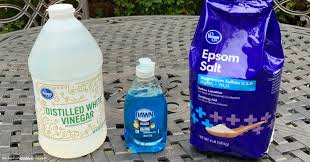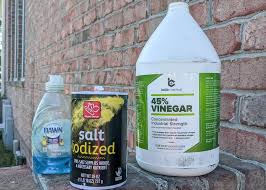Natural Weed Killer, Weeds can be the bane of any gardener’s existence. They sprout up unexpectedly, compete with plants for nutrients, and can quickly turn a well-maintained garden into an unsightly mess. While chemical herbicides offer a quick fix, they come with environmental and health concerns. For those looking for safer, eco-friendly alternatives, natural weed killers provide a compelling solution.
Why Choose a Natural Weed Killer?
Conventional weed killers often contain harsh chemicals like glyphosate, which have been linked to environmental damage, water contamination, and potential health risks for humans and pets. Natural weed killers, on the other hand, rely on non-toxic ingredients that are generally safer for the environment, wildlife, and your family. These solutions also support sustainable gardening practices by minimizing chemical runoff and soil degradation.
Top Natural Weed Killer Ingredients
- Vinegar: One of the most popular natural weed killers is vinegar. Its high acetic acid content is effective at dehydrating and killing weeds, especially when used on a sunny day. For maximum potency, use a vinegar solution with at least 20% acetic acid.
- Salt: Salt can also be a powerful weed killer when used correctly. When applied directly to weeds, it dehydrates them by drawing water out of the cells. However, be cautious with salt, as it can linger in the soil and harm desirable plants.
- Lemon Juice: The citric acid in lemon juice makes it a potent natural herbicide. When sprayed directly onto weeds, it breaks down their cell walls, causing them to wither and die. Lemon juice works best in full sun and when used in combination with other natural ingredients like vinegar.
- Boiling Water: Simple but effective, boiling water can kill weeds instantly by scorching their leaves and roots. This method is best for small patches of weeds, as it can also harm surrounding plants if not applied carefully.
- Essential Oils: Certain essential oils, like clove, cinnamon, and orange oil, contain natural herbicidal properties. They work by disrupting the cellular structure of weeds, leading to their eventual demise. Many commercial natural weed killers use essential oils as a primary ingredient.
- Corn Gluten Meal: While not a direct weed killer, corn gluten meal is a natural pre-emergent that prevents weed seeds from germinating. By applying it early in the season, you can reduce the number of weeds that take root in your garden.
DIY Natural Weed Killer Recipes
You can easily create your own natural weed killer at home using everyday ingredients. Here are a few tried-and-true recipes:
1. Vinegar & Salt Weed Killer
- 1 gallon of vinegar (20% acetic acid)
- 1 cup of salt
- 1 tablespoon of liquid dish soap
Mix the ingredients in a spray bottle and apply directly to weeds on a sunny day. The dish soap helps the solution stick to the leaves, while the vinegar and salt work together to dehydrate and kill the weeds.
2. Lemon Juice & Vinegar Weed Killer
- 1 cup of lemon juice
- 1 gallon of vinegar (20% acetic acid)
Combine the lemon juice and vinegar in a spray bottle and apply to weeds. The citric acid in the lemon juice enhances the effectiveness of the vinegar, particularly in sunny conditions.
3. Boiling Water
- Simply bring water to a boil and pour it directly onto the weeds. This method works best for weeds in driveways, sidewalks, or small garden areas.
How to Use Natural Weed Killers Effectively
- Apply on Sunny Days: Natural weed killers, especially those containing vinegar or lemon juice, work best when applied on sunny, dry days. The sun enhances their drying effects, making them more effective at killing weeds.
- Target Young Weeds: Natural solutions are often most effective on young, small weeds. Mature weeds with deep roots may require repeated applications or additional methods like hand-pulling.
- Spot-Treatment: Use natural weed killers as a spot treatment rather than spraying them indiscriminately across your garden. These solutions can harm any plant they touch, so it’s essential to apply them directly to the weeds.
- Monitor Soil Health: Some natural ingredients, like salt, can affect soil health if overused. Be mindful of how often you use certain natural weed killers and avoid over-application in areas where you plan to grow other plants.
Benefits of Going Natural
Switching to natural weed killers offers multiple benefits beyond just keeping your garden weed-free:
- Environmental Protection: Natural weed killers reduce the risk of contaminating soil, water, and local ecosystems with harmful chemicals.
- Safety: With natural ingredients, you can rest easy knowing that your pets, children, and beneficial insects like bees and butterflies are less likely to be harmed.
- Cost-Effective: Many natural weed killers can be made at home using inexpensive, readily available ingredients.
Conclusion
Maintaining a weed-free garden doesn’t have to come at the expense of the environment or your health. By using natural weed killers, you can enjoy a beautiful, thriving garden while supporting sustainable and eco-friendly gardening practices. Whether you’re a seasoned gardener or just starting, these natural solutions offer an effective, safe alternative to harsh chemical herbicides. Embrace the power of nature, and let your garden flourish!
You Might Also Like These:



